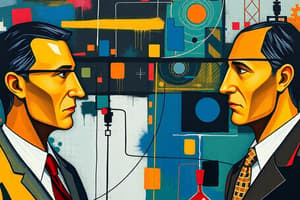Podcast
Questions and Answers
Which of the following is considered a potential conflict of interest for an engineer?
Which of the following is considered a potential conflict of interest for an engineer?
- Collaborating with regulators to ensure compliance with safety standards
- Owning shares in a company while providing professional services to that organization (correct)
- Maintaining close personal relationships with colleagues in the industry
- Prioritizing public safety over client preferences
What is the primary responsibility of engineers when it comes to safety regulations?
What is the primary responsibility of engineers when it comes to safety regulations?
- To advocate for stricter safety regulations to protect their clients' interests
- To follow established protocols and best practices to ensure public safety
- To collaborate with regulators to develop new safety guidelines that are more lenient for their industry
- To minimize risks to the public, even if it means overriding the preferences of their clients or employers (correct)
What is the purpose of safety regulations in engineering?
What is the purpose of safety regulations in engineering?
- To ensure the profitability of engineering projects
- To create a more competitive environment for engineering professionals
- To protect the interests of engineering firms and their clients
- To prevent harm to individuals and communities through the design, implementation, and maintenance of structures and systems (correct)
What is the 'standard of care' that engineers must follow when it comes to safety regulations?
What is the 'standard of care' that engineers must follow when it comes to safety regulations?
What is the role of ongoing education and collaboration in ensuring the safety of engineering projects?
What is the role of ongoing education and collaboration in ensuring the safety of engineering projects?
How do ethical principles help guide engineers in making decisions regarding conflicts of interest?
How do ethical principles help guide engineers in making decisions regarding conflicts of interest?
Which of the following is NOT a key aspect of professional responsibility for engineers?
Which of the following is NOT a key aspect of professional responsibility for engineers?
In the context of engineering ethics, what is meant by a conflict of interest?
In the context of engineering ethics, what is meant by a conflict of interest?
Which of the following is NOT a key aspect of professional responsibility for engineers, according to the information provided?
Which of the following is NOT a key aspect of professional responsibility for engineers, according to the information provided?
An engineer is offered a substantial financial incentive to take on a project that is outside their area of expertise. According to the principles of engineering ethics, what should the engineer do?
An engineer is offered a substantial financial incentive to take on a project that is outside their area of expertise. According to the principles of engineering ethics, what should the engineer do?
Which of the following scenarios would constitute a conflict of interest for an engineer?
Which of the following scenarios would constitute a conflict of interest for an engineer?
According to the information provided, which of the following statements is TRUE regarding engineering ethics?
According to the information provided, which of the following statements is TRUE regarding engineering ethics?
Flashcards are hidden until you start studying
Study Notes
Engineering Ethics: An Overview of Professional Responsibility, Conflict of Interest, and Safety Regulations
Introduction
Engineering ethics encompasses a set of principles and practices that define the moral and social expectations of individuals working in the engineering field. These guidelines help engineers navigate complex situations involving professional responsibility, conflict of interest, and safety regulations. This article delves into these subtopics, shedding light on the importance of upholding ethical standards in engineering practice.
Professional Responsibility
Professional responsibility refers to the obligation of engineers to act in accordance with their competencies, expertise, and societal expectations. Key aspects of professional responsibility include:
- Competency: Engineers must practice within their areas of expertise and avoid taking on tasks that exceed their capabilities.
- Confidentiality: Engineers must ensure that sensitive information remains confidential, sharing it only with the relevant parties and in accordance with legal requirements.
- Integrity: Engineers must uphold honesty, impartiality, fairness, and equity in their professional dealings.
Conflict of Interest
Conflicts of interest arise when personal interests or relationships interfere with an engineer's ability to perform their duties objectively and ethically. Examples of conflicts of interest include:
- Financial interests: Engaging in paid work or owning shares of a company while simultaneously offering professional services to that organization.
- Personal relationships: Having close ties to clients, employers, or colleagues that could potentially bias one's professional judgment.
To mitigate conflicts of interest, engineers are advised to disclose any potential conflicts to relevant parties, step down from a project if necessary, or implement safeguards to minimize any negative impacts.
Safety Regulations
Safety regulations govern the design, implementation, and maintenance of structures and systems to prevent harm to individuals and communities. Some key points regarding safety regulations include:
- Paramountcy clause: Engineers have a duty to prioritize public safety over all else, even if it means overriding the preferences of their clients or employers.
- Standard of care: Engineers must follow established protocols, guidelines, and best practices to ensure the safety of their work and reduce risks to the public.
Respecting safety regulations requires ongoing education, vigilance, and collaboration between engineers, regulators, and the broader community to create safer environments for everyone.
In conclusion, engineering ethics serves as a crucial foundation for the engineering profession, guiding professionals to make the right decisions in the face of challenging ethical dilemmas. By understanding and adhering to these principles, engineers can maintain their integrity and contribute to the betterment of society.
Studying That Suits You
Use AI to generate personalized quizzes and flashcards to suit your learning preferences.




